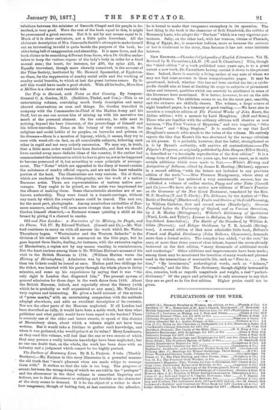Old and New London : a Narrative of its History,
its People, and its Places. Vol. IV. By Edward Walford. (Cassell and Co.)—Mr. Wal- ford continues to carry on with all success the work which Mr. Walter Thornbury began. " Westminster and the Western Suburbs " is the division of his subject which is announced on the title-page, but he goes beyond these limits, dealing, for instance, with the extensive •region of Bloomsbury, a region not by any means wanting in reminiscences. Not the least curious among these is Mr. William Hutton's account of his visit to the British Museum in 1784. (William Hutton wrote the History of Birmingham.) Admission was by tickets, and not more than ten tickets could be issued at once. Hutton paid two shillings for the ticket, was hurried with his party through the whole place in thirty minutes, and sums up his experiences by saying that it was "the only sight in London that disgusted him." The present system of general admission for three days in the week dates from 1810. About the British Museum, indeed, and especially about the library (with which he is probably as well acquainted as any man), Mr. Walford is very copious and interesting. He gives a lucid account of the system of "press marks," with an entertaining comparison with the methods adopt4d elsewhere, and adds an excellent description of its contents. Nor are the other parts of the Museum neglected. If all London had been described as fully, it would have been a noble work, but then what publisher and what public would have been equal to the burden? There is scarcely one of the older and better streets, to speak of this district of Bloomsbury alone, about which a volume might not have been written. But it would take a lifetime to gather such knowledge, and when it was gathered, who would prize it at its value ? Many Londoners, as they read this volume, will feel that the one or two streets of which they may possess a really intimate knowledge have been neglected ; but no one can doubt that, on the whole, the work has been done with an industry and a judgment which cannot be too highly praised.


































 Previous page
Previous page